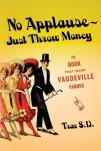Acrobats, jugglers, and animals acts are common to both the circus and vaudeville, but here’s the difference between the two forms of theatre: in the circus such performers are royalty; in the vaudeville of yore they were second and third class citizens. This is a distinction that’s been blurred since the 1970s, when the first wave of so-called New Vaudevillians came in — acts that were far more evocative of and representative of, the circus than vaudeville. (Non-verbal clowns might be considered an exception. Some were stars in vaudeville, certainly — but just as certainly they are not unique to, or representative of, vaudeville.)

At bottom, circus is about horses. The word (remember your Greek and Latin) means circle — it refers to that ring, which is just the right size for horses (often bearing trick riders) to run around and around and around.


A related concept is the hippodrome (roughly “horse track”). The ancient circus was different from the modern in that the spectacle often involved entertainments more akin to “sport”: races, for example, and brutal fights to the death.

The modern circus is usually traced to one Philip Astley, who began presenting equestrian entertainments in a ring in England in the late 18th century. The novelty was brought to the U.S. by one John Bill Ricketts, and later enhanced (into the kind of show modern audiences would recognize) by folks like the talking clown Dan Rice, P.T. Barnum and others in the 19th century. Unlike its European cousin which ensconces itself in permanent circus buildings, the American circus is itinerant. Like the medicine show and the showboat, the American version of circus is about traveling, historically in tents, bringing magic and wonder wherever it is needed.

While circus (like all live entertainment) was certainly once more prevalent in American society, it is a testament to its power and resilience that it remains a part of our lives to this day. Vaudeville, which placed its chips on a different model depending on a physical infrastructure (the theatre chains) went the way of the dodo. (It needn’t have been so, by the way. In the early days, folks like M.B. Leavitt, Weber and Fields and Tony Pastor crossed the country with touring vaudeville companies. Come to think of it, there’s no reason such an idea couldn’t be revived).
Some circus stars, like clown/ trick rider Poodles Hanneford (whose dynasty still performs today in circus) became vaudeville stars. More often, lots of vaudevillians got their start in circuses and worked their way up the show biz ranks, gradually abandoning their circus skills, usually to be comedians. Examples include Clark and McCullough, and Joe E. Brown.
To find lots of others, see the links to the clowns, acrobats, and jugglers categories on this blog. Also see the circus category for more on circus, including especially my little rants on circus aesthetics here and here.
To learn more about the variety arts past and present, including circus and vaudeville, consult No Applause, Just Throw Money: The Book That Made Vaudeville Famous, available at Amazon, Barnes and Noble, and wherever books are sold.



Hi there. I just came across your page when doing a search for the difference between circus and vaudeville. You stated, “Acrobats, jugglers, and animals acts are common to both the circus and vaudeville, but here’s the difference between the two forms of theatre: in the circus such performers are royalty; in the vaudeville of yore they were second and third class citizens.” Is there any additional reference or reading you could point me to demonstrating the performers of the circus were royalty? This was the first I had heard of this, and find it intriguing. Thank you!
LikeLike
The circus ring is a horse ring. It exists because of equestrianism. Circuses were originally outdoors, and later in tents (in the US) and extremely large venues, so mute acts are prized where acoustic conditions aren’t ideal. These facts are ubiquitous commmonplaces which ought to be in every book on the circus. The word royalty is subjective, completely my own (but the fact that you see it constantly on circus posters). Good luck in your own voyage of discovery.
LikeLike